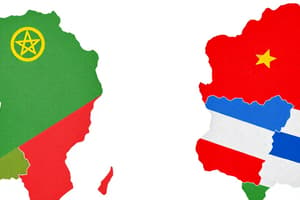Podcast
Questions and Answers
What is a key theme presented in Baldwin D.'s work?
What is a key theme presented in Baldwin D.'s work?
- The development of scientific theories
- The exploration of racial identity (correct)
- The impact of technology on society
- The influence of economic policies
Which literary technique is prominently used in the extract by Baldwin D.?
Which literary technique is prominently used in the extract by Baldwin D.?
- Stream of consciousness
- Metaphor
- Symbolism
- Imagery (correct)
What emotional response is Baldwin D. likely aiming to evoke in the reader?
What emotional response is Baldwin D. likely aiming to evoke in the reader?
- Fear and anxiety
- Anger and frustration (correct)
- Indifference and apathy
- Joy and happiness
Which audience is Baldwin D. primarily addressing in his extract?
Which audience is Baldwin D. primarily addressing in his extract?
What narrative perspective is used in Baldwin D.'s extract?
What narrative perspective is used in Baldwin D.'s extract?
Flashcards
Repeated Content Error
Repeated Content Error
The content provided contains repeated information, spanning from page 14 to 20 of a text by author Baldwin D. The text extract repeats seven times, likely due to an error in formatting or document structuring.
Junk Content
Junk Content
The repetition of the same text extract suggests that the content could be considered "junk" due to its lack of useful information.
Formatting Issues
Formatting Issues
The presence of repetitions indicates that the content was likely formatted incorrectly.
Document Structure
Document Structure
Signup and view all the flashcards
Document Quality
Document Quality
Signup and view all the flashcards
Study Notes
Anarchy and Social Order
- Anarchy is a key concept in realist theories of international politics, but less prominent in liberal theories.
- Neoliberal authors also use the assumption of anarchy.
- However, neorealists and neoliberals don't necessarily agree on the meaning or consequences of anarchy.
- Anarchy is a complex and ambiguous term, often associated with chaos and disorder.
- In world politics, some order exists, even if neorealists and neoliberals disagree on its nature, extent, and causes.
- Most theorists define anarchy as the absence of government.
- This definition raises questions about what "government" entails.
- Many governmental activities have counterparts at the international level (e.g., welfare, economics, law, commerce, health, safety).
- This suggests alternative conceptions of anarchy that focus on missing governmental characteristics.
- There is not a universal agreement on the specific characteristics that define international anarchy.
Scope and Domain
- Debates on relative gains in international politics often lack precise definitions of "gains" (in capabilities).
- Power relations' causal connection typically affects behavior, attributes, beliefs, and propensities of other actors.
- To understand power, domain and scope need precise definition.
- "Country A has power" should be rephrased as "Country A causes [specific effects] with respect to [whom]."
- Specificity and clarity regarding the level of "scope" are important (e.g., "lots of things").
- The causal notion of power is rejected by some, highlighting alternatives.
Capabilities and Cooperation
- Power's definition in realist theory is controversial, with varied interpretations.
- Different theoretical approaches (neoliberal and neorealist) treat the concept of power differently.
- This can lead to different understandings of capabilities and consequences of anarchy.
- Social science research should investigate instances of social phenomena.
- Social scientists analyze social order using factors like exchange relations, threat systems, and image integration.
- These concepts are applicable to international relations.
Zero-Sum Problem
- The idea of power as zero-sum (one actor gains, another loses) is prevalent but often inaccurate,
- Zero-sum assumptions in the literature are frequently debatable.
- Power gains by one actor don't necessarily imply commensurate losses by others.
- Different examples, like international relations scenarios, illustrate that gains in one area can lead to different outcomes than conventional zero-sum theories suggest.
- This debate highlights the need for clarification when discussing and applying theories of power to international relations.
Studying That Suits You
Use AI to generate personalized quizzes and flashcards to suit your learning preferences.




